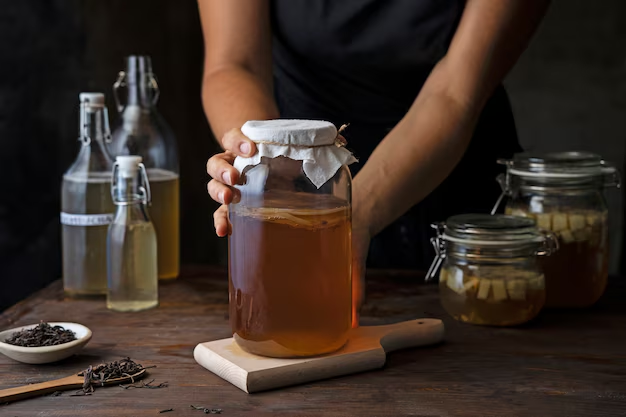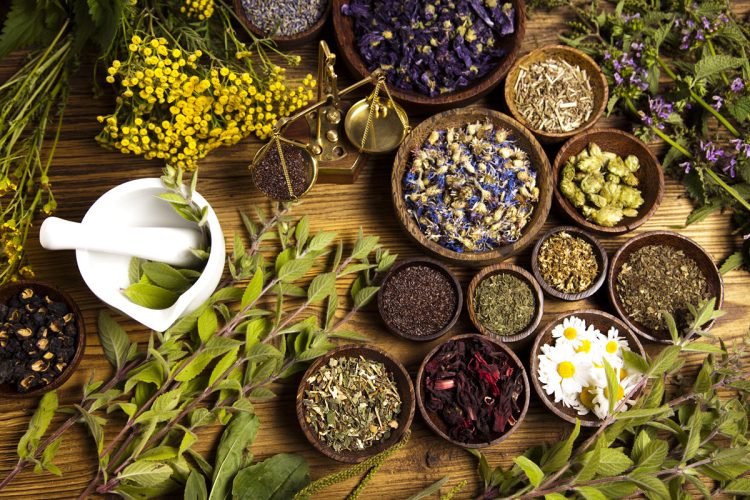Herbs have been used for centuries, not just for their flavors and aromas, but also for their medicinal properties. What’s often overlooked is how versatile they can be when incorporated into your daily routine—not just in your cooking, but in your drinks and wellness practices as well. Fresh herbs can transform ordinary dishes into extraordinary experiences while offering a variety of health benefits, from aiding digestion to soothing the mind.
In this article, we’ll explore how to harness the power of common herbs, such as basil, rosemary, mint, and lavender, to enhance your meals, beverages, and overall sense of well-being. From infusing water and making herbal teas to creating wellness remedies and delicious sauces, herbs can become your go-to ingredient for both culinary adventures and self-care practices.
Let’s dive into the world of herbal infusions and discover how these green wonders can boost your health, improve your mood, and add new dimensions to your kitchen creations.
Introduction: Discovering the Magic of Fresh Herbs
When we think of herbs, the first thing that often comes to mind is a garnish, or perhaps a simple addition to a salad or soup. However, these vibrant green plants hold so much more potential than we give them credit for. Fresh herbs like basil, rosemary, thyme, mint, and lavender offer more than just flavor—they can enhance our well-being and create mindful moments of connection with nature.
The aromatic oils found in herbs have been shown to promote relaxation, focus, and even digestive health. Herbs can stimulate the senses, calm the mind, and bring a little peace into our busy lives. By incorporating them into our daily routines, not only do we enjoy their benefits, but we also cultivate a more intentional, health-conscious lifestyle.
But how can we take full advantage of herbs? How can we use them in ways that go beyond a simple sprinkle on top of a dish? Let’s explore how herbs can be used in drinks, cooking, and wellness practices to create a balanced and vibrant lifestyle.
Beyond Garnish: How to Use Herbs in Drinks, Cooking, and Wellness
1. Drinks: Infusing Water and Beverages
Herbs can be the perfect addition to your drinks, offering refreshing flavors and health benefits. By infusing herbs in water or incorporating them into beverages, you can elevate your hydration routine while reaping the wellness benefits of each herb.
Mint-Infused Water:
One of the easiest ways to incorporate herbs into your hydration routine is by adding mint to your water. Simply place fresh mint leaves in a jug of water, and let them infuse for 30 minutes. Mint is known for its cooling properties, making it the perfect addition to water on a hot day. It also has digestive benefits and can help soothe an upset stomach.
Rosemary Lemonade:
Rosemary, with its earthy, pine-like flavor, adds depth and complexity to lemonade. To make rosemary lemonade, simmer fresh rosemary sprigs in water to create an infusion. Combine this rosemary infusion with freshly squeezed lemon juice, honey, and ice for a refreshing and aromatic drink. Rosemary has been shown to improve memory and cognitive function, making this drink not just refreshing but also brain-boosting.
Lemon Balm Iced Tea:
Lemon balm is a calming herb known for its ability to relieve stress and promote relaxation. To make lemon balm iced tea, steep fresh lemon balm leaves in hot water for about 5 minutes, then strain and chill the liquid. Add ice, a squeeze of lemon, and a little honey for sweetness. This soothing drink is ideal for unwinding after a long day.
2. Cooking: Fresh Herbs That Pack a Flavor Punch
Herbs are essential for creating depth and complexity in your dishes. From savory pesto to fragrant sauces, these herbs can turn an ordinary meal into something extraordinary.
Basil Pesto:
Basil is the quintessential herb for creating a fresh, vibrant pesto. To make basil pesto, blend fresh basil leaves with garlic, pine nuts, Parmesan cheese, and olive oil. This versatile sauce can be used for pasta, as a topping for roasted vegetables, or even as a spread for sandwiches and wraps. Basil is known for its anti-inflammatory properties and its ability to boost immune health.
Sage Brown Butter Sauce:
Sage adds a warm, earthy flavor to dishes, and when paired with browned butter, it creates a rich sauce that can elevate any meal. To make sage brown butter, melt butter in a pan, and cook until it turns golden brown. Add fresh sage leaves to the butter and cook until fragrant. This sauce is perfect over pasta, roasted vegetables, or even chicken. Sage is known for its digestive benefits and its ability to reduce stress and anxiety.
Thyme-Infused Olive Oil:
Thyme is a robust herb that pairs well with savory dishes. To make thyme-infused olive oil, simply add fresh thyme sprigs to a bottle of olive oil and let it sit for a few days to infuse. Use this oil to drizzle over roasted vegetables, to sauté meats, or as a dip for bread. Thyme is also an excellent antimicrobial herb that supports respiratory health.

3. Wellness: Herbal Remedies for Mind and Body
Herbs can be used in wellness practices to help calm the mind, support digestion, and promote overall relaxation. Incorporating these herbs into your wellness routine can help you feel more grounded and centered, especially during times of stress or imbalance.
Calming Lavender Milk:
Lavender is widely known for its calming effects, especially in helping with sleep and relaxation. To make lavender milk, heat a cup of milk (or a non-dairy alternative) and add a few drops of lavender essential oil or a small handful of dried lavender flowers. Sweeten with honey or maple syrup, and enjoy this relaxing beverage before bed. Lavender can help ease anxiety, promote better sleep, and reduce muscle tension.
Ginger and Mint Digestive Tea:
Ginger and mint are a powerful combination when it comes to supporting digestion. To make this soothing tea, steep fresh ginger slices in hot water for about 5 minutes, then add a handful of fresh mint leaves and steep for another 2 minutes. This tea helps with bloating, nausea, and digestive discomfort. Ginger also has anti-inflammatory properties, and mint is great for soothing the stomach and aiding digestion.
Chamomile and Lemon Balm Relaxation Tea:
Chamomile and lemon balm are both well-known for their calming properties. To make a relaxing tea, steep chamomile flowers and lemon balm leaves in hot water for 5-10 minutes. This tea is perfect for unwinding before bed or during stressful moments. Chamomile helps with sleep, while lemon balm reduces anxiety and promotes a sense of calm.
The Sensory Experience: Mindfulness with Herbs
Using herbs in your daily routine is not just about adding flavor to your food or drink—it’s also an opportunity to engage with your senses. The act of preparing herbal infusions, whether in the form of a calming tea or a vibrant pesto, can become a mindful practice that encourages you to slow down and be present.
When you chop fresh herbs, inhale their aromas, and stir them into your meals, you’re engaging in a sensory experience that encourages mindfulness. The fresh, earthy smells of basil or rosemary, the vibrant green color of mint, and the soothing touch of lavender can bring a sense of peace and relaxation.
Taking time to enjoy these sensory experiences can help reduce stress, increase focus, and bring moments of calm into your busy life. Try setting aside a few minutes each day to engage with your herbs mindfully—whether you’re preparing a cup of herbal tea, making a batch of pesto, or simply breathing in the fresh aroma of rosemary before adding it to your dish.
Call to Action: Grow Your Own Herb Garden
One of the most fulfilling ways to connect with the power of herbs is to grow them yourself. Fresh herbs are easy to grow, even if you don’t have a garden. A small windowsill herb garden can provide you with a steady supply of fresh, aromatic herbs, perfect for your cooking, drinks, and wellness practices.
To start your own herb garden, you’ll need some basic supplies:
- Containers: Small pots or containers with drainage holes.
- Soil: Choose well-draining potting soil.
- Herb Seeds or Starter Plants: Popular herbs to start with include basil, mint, rosemary, thyme, and parsley.
- Sunlight: Place your herbs in a sunny spot with at least 4-6 hours of sunlight per day.
Start small and experiment with different herbs to find the ones that you use most in your daily life. Not only will you enjoy fresh herbs at your fingertips, but you’ll also experience the therapeutic benefits of growing your own plants and watching them flourish.
Conclusion: The Healing Power of Herbs
Herbs are not only a fantastic addition to your meals but also an easy and effective way to support your overall well-being. Whether you’re using them in drinks, cooking, or wellness practices, the power of herbs can enhance your physical, mental, and emotional health. By incorporating more herbs into your daily routine, you can elevate your meals, enjoy calming moments, and promote better health—all while adding a bit of beauty and nature to your home.
Now that you know the many ways you can use herbs in your life, it’s time to embrace their full potential. So, why not start with a small herb garden and experiment with herbal infusions that speak to your wellness needs? The world of herbs is waiting to be explored, and it’s all just a few leaves away.

































